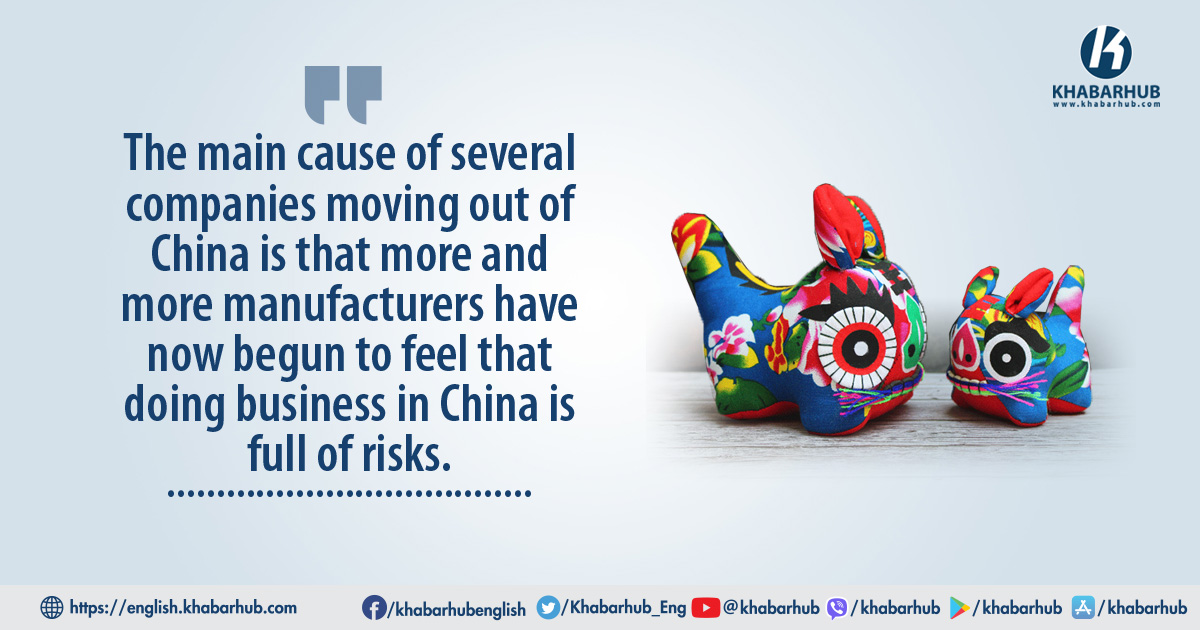After big tech, footwear and apparel companies decided to leave China’s shores, it is now the turn of toy companies which are gearing up for shifting their production bases in the world’s second economic power to countries in South Asia and Southeast Asia as they are grappling with high labour costs and uncertainties arising from geopolitical tensions in the region.
Giving China’s toy story a big jolt, Bandai, a Japanese company that makes popular brands like DragonBall, Tamagotchi, Anime Heroes, and video games for children, is planning to shift manufacturing units for some of key toy brands to Thailand and other countries from the East Asian country, said Reuters in its latest report.
Hasbro, a global player in toy and entertainment world, which learnt cruel lessons during three years of Covid-19 pandemic in China where it had to freeze production operations and struggled to meet export demands in Europe and the US, does not want to rely anymore on the country for most of its production.
It should be noted that since opening up its economy to the world four decades ago, China has become the largest manufacturer of toys because of ample supply of cheap labour and facilities and infrastructure provided by the government to toy companies.
In 2023, it cut its revenue forecast to a 13% to 15% from earlier view of a 3% to 6% decline.
According to CNBC, Hasbro has been diversifying its manufacturing operations since 2012 due to several risk factors in China.
Rather the toy company is seeing opportunities in Vietnam, Mexico, and the South Asian region to shift its production bases and consequent, growth.
Mattel, the toy company whose top-selling brands like Barbie doll, Hot Wheels car and Mega Bloks are household names in the world, has already moved a significant part of its supply chain out of China to Canada and Mexico and other parts of the globe.
As per The Wall Street Journal, the maker of Barbie dolls and Hot Wheels cars shut manufacturing sites in China and Indonesia in 2019.
China accounts for more than 70% of the total toys being manufactured in the world. It traditionally manufactures electronic, mechanical, plastic, and wooden toys.
Dongguan, an industrial city which lies in Guangdong province, is a toy manufacturing hub in China.
The city boasts over 4,000 toy makers. As of 2022, Dongguan had 87 large-scale enterprises involved in art toy production, with a total industrial output value of $2.32 billion, Xinhua news said.
However, the number of businesses in the toy manufacturing industry in China has declined 0.3% per year on an average over the five years between 2019-2024, said IBISWorld, a US-based research and analysis group.
For this, lessening of demand in the American and Europe market for China made toys is considered as the main reason.
In the first seven months of 2023, China made toys could make 79% of the total toys sold in the US and Europe, in comparison to 82% in 2019, data from S&P Global Market Intelligence said.
US-China trade wars, rising production costs and a weak global economy are cited as reasons for overall decline in businesses by toys industry in China.
In its 2023 surveys of business confidence, the European Union Chamber of Commerce in China reported that a “record high 64% of respondents reported that doing business in China” has become more difficult.
It should be noted that since opening up its economy to the world four decades ago, China has become the largest manufacturer of toys because of ample supply of cheap labour and facilities and infrastructure provided by the government to toy companies.
But now several toy firms have started following the path of tech, footwear, and apparel companies which are reevaluating their risks and reviewing their mitigation strategies in China.
In 2021, giant tech companies such as IBM pulled down the shutter on a research laboratory in China after operating there for a quarter of a century, while Yahoo and LinkedIn announced plans to move out of the country.
American big electronic companies like Microsoft, Apple, Google, Dell, and HP have already diversified part of their operations from China to Vietnam, and other South and Southeast Asian nations.
Gallup, the polling, and consulting group, is the latest American company to move out of China.
According to the November 4 report of Financial Times, the Washington-based advisory group which came to China in 1993, employed dozens of people at its offices in Beijing, Shanghai, and Shenzhen, but it decided to wrap up its activities in the country.
US-based companies like Forrester Research, a technology-focussed consultancy firm, reduced its footprint in China, while Gerson Lehrman Group, an expert network group, brought down its presence in the world’s second economic power.
Financial Review quoting the American Chamber of Commerce’s 2023 China Business Report said 40% of 325 American companies polled said they were redirecting or planning to move investment originally planned for China towards Southeast Asia or other parts of the world.
While 22% said they were decreasing their investments because they were worried about deteriorating Sino-US relations and an unpredictable environment under President Xi’s leadership.
Among various reasons behind the growing number of foreign companies leaving Chinese shores are: Beijing’s emphasis on national security, raids on foreign companies and strict data laws.
In all, the moot cause of several companies moving out of China is that more and more manufacturers have now begun to feel that doing business in China is full of risks, given Beijing’s designs over Taiwan and not-so-happy relations with the US, despite efforts from both sides to defrost tension between the two countries.
In its 2023 surveys of business confidence, the European Union Chamber of Commerce in China reported that a “record high 64% of respondents reported that doing business in China” has become more difficult.
Between January and June 2023, as per South China Morning Post, 11% of the total European Union companies had already moved their investments out of China.
But not only western companies are exiting from China, Japanese and South Korean firms are also saying goodbye to the world’s second economic power.
According to CEO Score, a market tracker, a total of 46 production and incorporated units whose parent companies are based in South Korea, closed their operations in China over the past six years.
From January to June 2023, South Korean investors set up only 87 new companies in China, down from 99 during the same period in 2022 when the world’s second largest economy was still following zero-Covid restrictions, the ChosunIlbo, a daily South Korean newspaper said quoting data from the Export-Import Bank of Korea.
Noted South Korean companies like Samsung Electronics, Hyundai Motor and LG have decided to relocate their production line to Japan, Vietnam, and other countries.
Similarly, a sizable number of Japanese companies are relocating their manufacturing bases to Vietnam and the countries of the South Asian region.
Top Japanese multinational companies such as Toyota, Honda, Nissan, Mazda, Suzuki, Kawasaki, Mitsubishi, Toshiba, Hitachi, Sony, Nikon, Canon, and Pioneer have their bases in China.
After Sony and Daikin shut down their operations in China, Mitsubishi, Honda, and Mazda have also decided to completely stop production in the East Asian country.
In all, the moot cause of several companies moving out of China is that more and more manufacturers have now begun to feel that doing business in China is full of risks, given Beijing’s designs over Taiwan and not-so-happy relations with the US, despite efforts from both sides to defrost tension between the two countries.









Comment